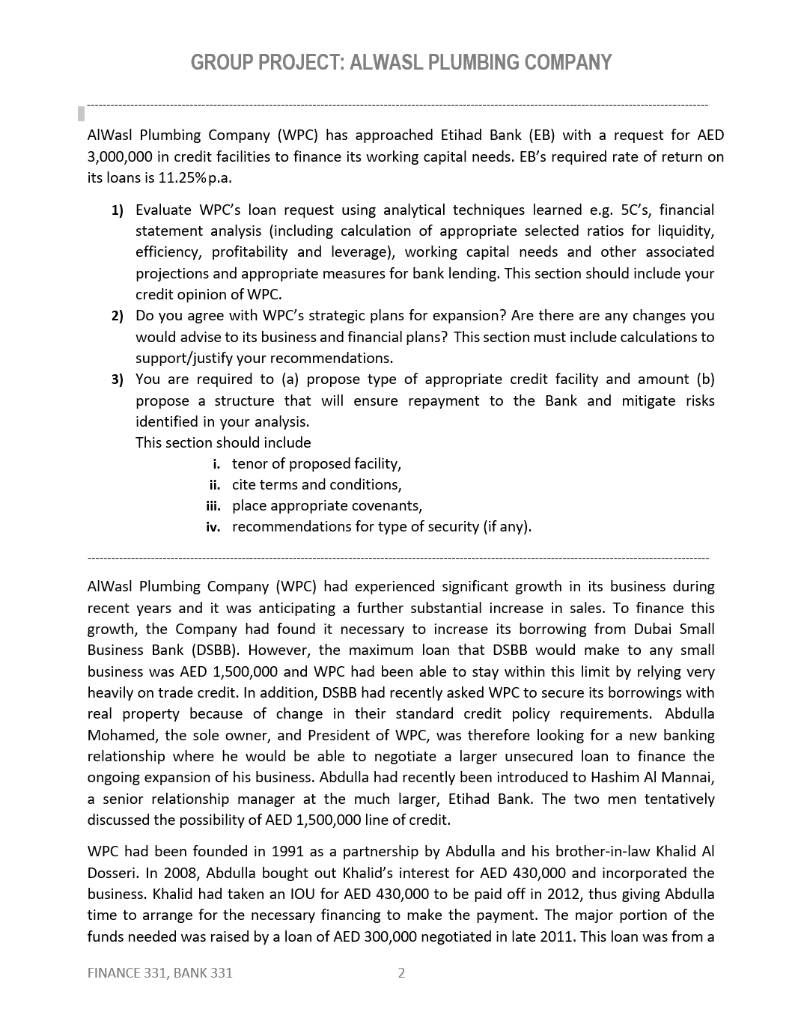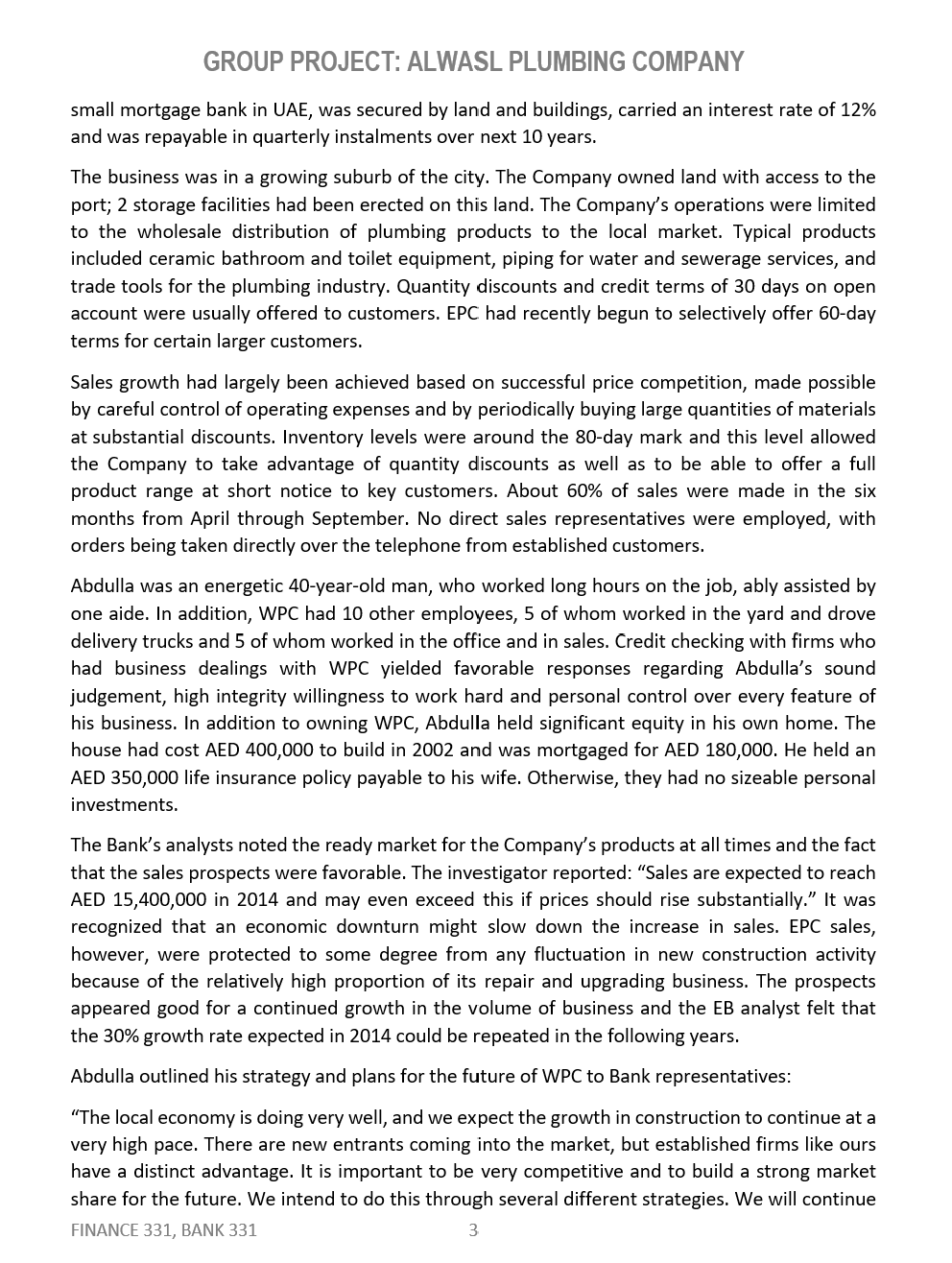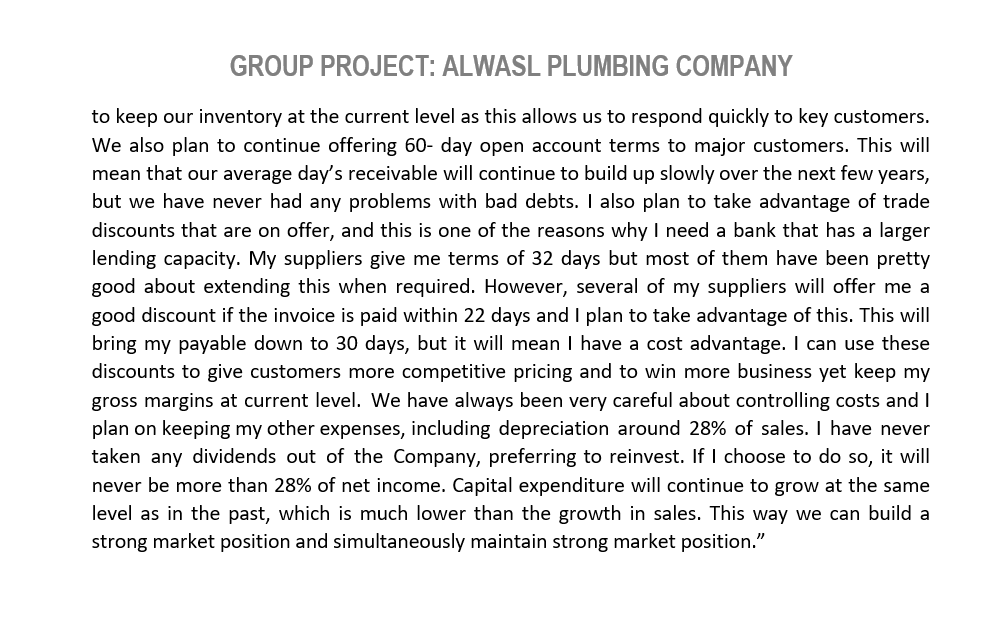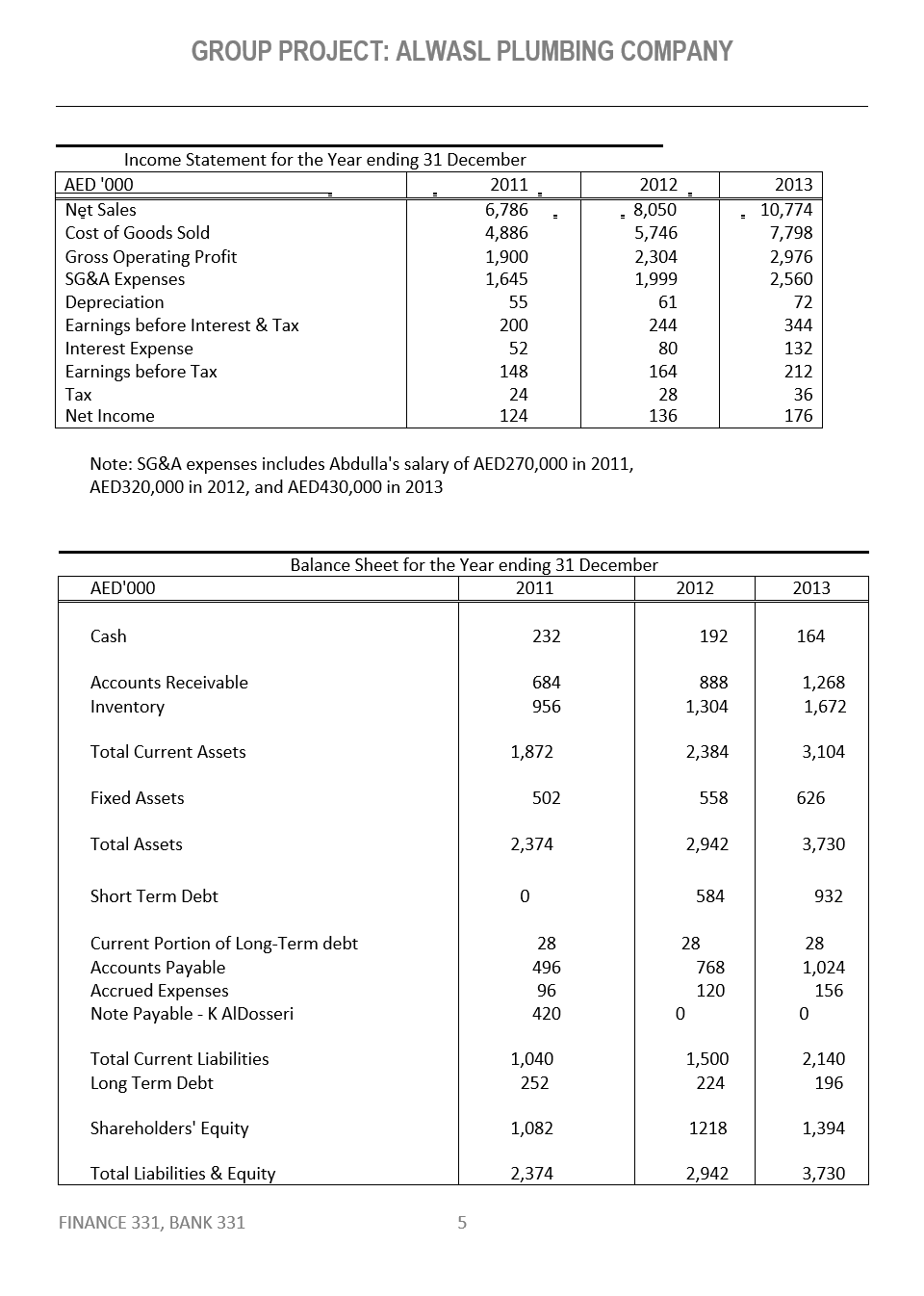Home /
Expert Answers /
Finance /
group-project-alwasl-plumbing-company-alwasl-plumbing-company-wpc-has-approached-etihad-bank-e-pa386
(Solved): GROUP PROJECT: ALWASL PLUMBING COMPANY AlWasl Plumbing Company (WPC) has approached Etihad Bank (E ...
GROUP PROJECT: ALWASL PLUMBING COMPANY AlWasl Plumbing Company (WPC) has approached Etihad Bank (EB) with a request for AED \( 3,000,000 \) in credit facilities to finance its working capital needs. EB's required rate of return on its loans is \( 11.25 \% \) p.a. 1) Evaluate WPC's loan request using analytical techniques learned e.g. \( 5 C^{\prime} \) s, financial statement analysis (including calculation of appropriate selected ratios for liquidity, efficiency, profitability and leverage), working capital needs and other associated projections and appropriate measures for bank lending. This section should include your credit opinion of WPC. 2) Do you agree with WPC's strategic plans for expansion? Are there are any changes you would advise to its business and financial plans? This section must include calculations to support/justify your recommendations. 3) You are required to (a) propose type of appropriate credit facility and amount (b) propose a structure that will ensure repayment to the Bank and mitigate risks identified in your analysis. This section should include i. tenor of proposed facility, ii. cite terms and conditions, iii. place appropriate covenants, iv. recommendations for type of security (if any). AlWasl Plumbing Company (WPC) had experienced significant growth in its business during recent years and it was anticipating a further substantial increase in sales. To finance this growth, the Company had found it necessary to increase its borrowing from Dubai Small Business Bank (DSBB). However, the maximum loan that DSBB would make to any small business was AED 1,500,000 and WPC had been able to stay within this limit by relying very heavily on trade credit. In addition, DSBB had recently asked WPC to secure its borrowings with real property because of change in their standard credit policy requirements. Abdulla Mohamed, the sole owner, and President of WPC, was therefore looking for a new banking relationship where he would be able to negotiate a larger unsecured loan to finance the ongoing expansion of his business. Abdulla had recently been introduced to Hashim Al Mannai, a senior relationship manager at the much larger, Etihad Bank. The two men tentatively discussed the possibility of AED 1,500,000 line of credit. WPC had been founded in 1991 as a partnership by Abdulla and his brother-in-law Khalid Al Dosseri. In 2008, Abdulla bought out Khalid's interest for AED 430,000 and incorporated the business. Khalid had taken an IOU for AED 430,000 to be paid off in 2012, thus giving Abdulla time to arrange for the necessary financing to make the payment. The major portion of the funds needed was raised by a loan of AED 300,000 negotiated in late 2011. This loan was from a FINANCE 331, BANK 331 2
GROUP PROJECT: ALWASL PLUMBING COMPANY small mortgage bank in UAE, was secured by land and buildings, carried an interest rate of \( 12 \% \) and was repayable in quarterly instalments over next 10 years. The business was in a growing suburb of the city. The Company owned land with access to the port; 2 storage facilities had been erected on this land. The Company's operations were limited to the wholesale distribution of plumbing products to the local market. Typical products included ceramic bathroom and toilet equipment, piping for water and sewerage services, and trade tools for the plumbing industry. Quantity discounts and credit terms of 30 days on open account were usually offered to customers. EPC had recently begun to selectively offer 60-day terms for certain larger customers. Sales growth had largely been achieved based on successful price competition, made possible by careful control of operating expenses and by periodically buying large quantities of materials at substantial discounts. Inventory levels were around the 80-day mark and this level allowed the Company to take advantage of quantity discounts as well as to be able to offer a full product range at short notice to key customers. About \( 60 \% \) of sales were made in the six months from April through September. No direct sales representatives were employed, with orders being taken directly over the telephone from established customers. Abdulla was an energetic 40-year-old man, who worked long hours on the job, ably assisted by one aide. In addition, WPC had 10 other employees, 5 of whom worked in the yard and drove delivery trucks and 5 of whom worked in the office and in sales. Credit checking with firms who had business dealings with WPC yielded favorable responses regarding Abdulla's sound judgement, high integrity willingness to work hard and personal control over every feature of his business. In addition to owning WPC, Abdulla held significant equity in his own home. The house had cost AED 400,000 to build in 2002 and was mortgaged for AED 180,000. He held an AED 350,000 life insurance policy payable to his wife. Otherwise, they had no sizeable personal investments. The Bank's analysts noted the ready market for the Company's products at all times and the fact that the sales prospects were favorable. The investigator reported: "Sales are expected to reach AED 15,400,000 in 2014 and may even exceed this if prices should rise substantially." It was recognized that an economic downturn might slow down the increase in sales. EPC sales, however, were protected to some degree from any fluctuation in new construction activity because of the relatively high proportion of its repair and upgrading business. The prospects appeared good for a continued growth in the volume of business and the EB analyst felt that the \( 30 \% \) growth rate expected in 2014 could be repeated in the following years. Abdulla outlined his strategy and plans for the future of WPC to Bank representatives: "The local economy is doing very well, and we expect the growth in construction to continue at a very high pace. There are new entrants coming into the market, but established firms like ours have a distinct advantage. It is important to be very competitive and to build a strong market share for the future. We intend to do this through several different strategies. We will continue FINANCE 331, BANK 331 3
GROUP PROJECT: ALWASL PLUMBING COMPANY to keep our inventory at the current level as this allows us to respond quickly to key customers. We also plan to continue offering 60- day open account terms to major customers. This will mean that our average day's receivable will continue to build up slowly over the next few years, but we have never had any problems with bad debts. I also plan to take advantage of trade discounts that are on offer, and this is one of the reasons why I need a bank that has a larger lending capacity. My suppliers give me terms of 32 days but most of them have been pretty good about extending this when required. However, several of my suppliers will offer me a good discount if the invoice is paid within 22 days and I plan to take advantage of this. This will bring my payable down to 30 days, but it will mean I have a cost advantage. I can use these discounts to give customers more competitive pricing and to win more business yet keep my gross margins at current level. We have always been very careful about controlling costs and I plan on keeping my other expenses, including depreciation around \( 28 \% \) of sales. I have never taken any dividends out of the Company, preferring to reinvest. If I choose to do so, it will never be more than \( 28 \% \) of net income. Capital expenditure will continue to grow at the same level as in the past, which is much lower than the growth in sales. This way we can build a strong market position and simultaneously maintain strong market position."
GROUP PROJECT: ALWASL PLUMBING COMPANY Note: SG\&A expenses includes Abdulla's salary of AED270,000 in 2011, AED320,000 in 2012, and AED430,000 in 2013
Expert Answer
As per given data, 1.Evaluating wpc’s loan request using analytical techniques learned from 5 Cs. The Etihad bank evaluates the credit analysis of fin



